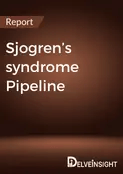Sjögren’s syndrome is a long-term autoimmune disease that mainly attacks the body’s moisture-producing glands, particularly the salivary and lacrimal glands. This damage leads to hallmark symptoms such as dry eyes and dry mouth, often paired with fatigue, joint pain, and in some cases, organ involvement that affects the lungs, kidneys, or nervous system. Historically, Sjogren’s syndrome Treatment has focused on symptom management rather than addressing the root cause, but growing knowledge of the disease’s immunology is opening the door to more targeted therapies.
The evolving Sjogren’s syndrome Pipeline reflects this progress, with a strong emphasis on regulating immune system dysfunction. A major area of focus is B-cell activity, since B cells generate autoantibodies and drive inflammation. Monoclonal antibodies that block the BAFF receptor, critical for B-cell survival, are under investigation and may help reduce the pool of autoreactive B cells. Similarly, new fusion proteins are being studied to disrupt the CD40–CD40L interaction between T cells and B cells, a pathway essential to sustaining autoantibody production.
Beyond these adaptive immune strategies, therapies targeting innate immunity are gaining momentum. For instance, inhibitors of the STING pathway are being developed to calm the overactive inflammatory signals without weakening the body’s ability to fight infections. Another promising strategy involves Bruton’s tyrosine kinase (BTK) inhibitors, which block a vital enzyme in B-cell signaling. These small-molecule drugs, often taken orally, may provide patients with a more convenient alternative to injectable biologics. At the same time, neonatal Fc receptor inhibitors are progressing through Sjogren’s syndrome Clinical Trials. By shortening the lifespan of harmful IgG antibodies, they could lessen tissue damage and disease severity.
While much of the pipeline focuses on immune regulation, regenerative medicine is offering new approaches to restore function. Researchers are developing therapies that repair damage to salivary and lacrimal glands, aiming not just to stop disease activity but to reverse some of its consequences. Cell-based therapies are also emerging, particularly the use of natural killer (NK) cells, which may help rebalance immune activity. These treatments could work alongside monoclonal antibodies by improving immune clearance of harmful cells.
The rise of technology-driven research is further reshaping the development landscape. Artificial intelligence is being applied to design precise new Sjogren’s syndrome Drugs. By creating molecules tailored to specific pathways, AI allows for therapies that maximize benefit while reducing unwanted side effects. This direction supports the growing movement toward precision medicine in autoimmune diseases.
The involvement of leading Sjogren’s syndrome Companies is also accelerating innovation. Pharmaceutical and biotech firms are investing heavily, forming collaborations, and benefiting from regulatory support designed to encourage the development of treatments for conditions with high unmet needs. This competitive environment is helping move promising therapies through clinical development more rapidly.
Together, these advances suggest that the future of Sjögren’s care is shifting from symptom relief to disease modification. Therapies now in development aim to slow or halt disease progression, protect organs, restore glandular function, and potentially achieve remission.
In summary, the landscape of Sjogren’s syndrome Treatment is changing rapidly. With biologics, small-molecule inhibitors, cell therapies, regenerative strategies, and AI-designed drugs in development, patients may soon have access to therapies that not only ease symptoms but also change the course of the disease itself.
Latest Reports Offered by Delveinsight:
Cart-related Neurotoxicity Market | Eosinophilia Market | Interbody Cages Market | Mammography Devices Market | Moderate Psoriasis Market | Pelvic Organ Prolapse Market | Phenylketonuria Market | Skin Burns Market | Transfusion-dependent Thalassaemia Market | Cancer Vaccines Market | Cardiac Monitoring System Market | Celiac Disease Market | Desmoplastic Small Round Cell Tumors Dsrcts Market | Esophageal Cancer Market | Fetal And Neonatal Monitoring Devices Market Market | Gender Dysphoria Market | Her3 Market | Hernia Repair Devices Market | Neurofibroma Market | Non Alcoholic Fatty Liver Disease Nafld Market | Nosocomial Infections Market | Oxygen & Hyperbaric Oxygen Equipment Market | Parkinson’s Disease Market | Phototherapies For Psoriasis Market | Spinal Cord Stimulators Market | Tbi Market | Vascular Graft Devices Market | Vulvar Cancer Market
About DelveInsight
DelveInsight is a trusted provider of life sciences and pharmaceutical market research and consulting, offering actionable insights that empower organizations to make informed decisions. With a commitment to delivering strategic intelligence, DelveInsight serves as a key partner to global pharmaceutical, biotechnology, and healthcare companies looking to excel in an evolving market landscape.
Contact Us
Kanishk
Email: kkumar@delveinsight.com

